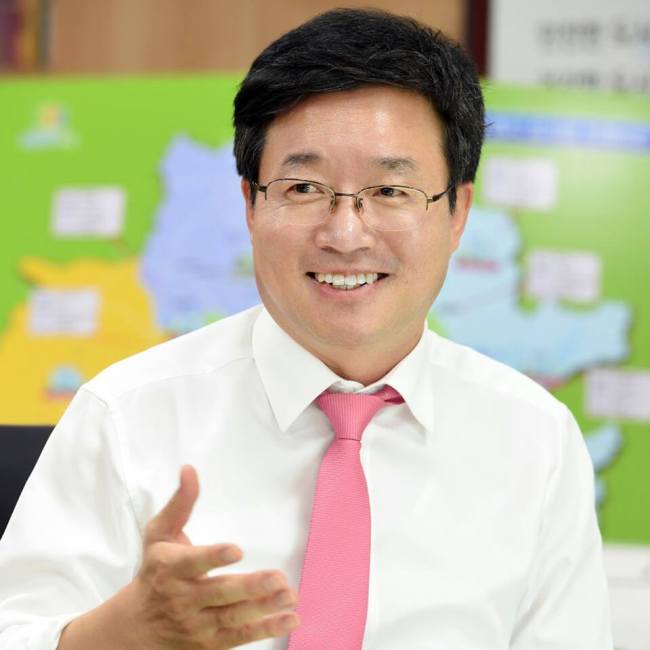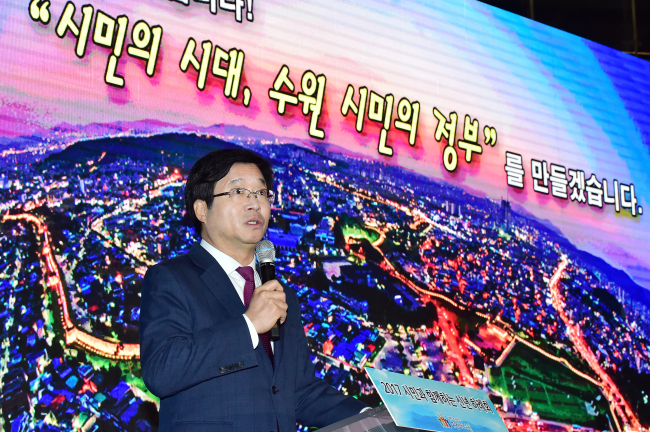[Herald Interview] Suwon, a city for the citizens, by the citizens
Mayor Yeom vows renewed commitment to democracy
By KH디지털2Published : Feb. 9, 2017 - 15:02
Suwon, a city just south of Seoul, is known mostly for being home to the headquarters of the world’s No. 1 chipmaker Samsung Electronics and the UNESCO-designated Hwaseong Fortress.
Its mayor now wants to make the city famous for something else: democracy.
“I will work to make a government for the citizens, by the citizens,” said Suwon Mayor Yeom Tae-young in an interview with The Korea Herald. “What people demanded during the candlelight protests (against President Park Geun-hye) is to build a government of the citizens. The protests have brought the peoples’ right back to the place where it is supposed to be.”
Yeom, who worked at the Presidential Office for the late liberal President Roh Moo-hyun, didn’t shy away from expressing his critical view of the current conservative state chief.
Its mayor now wants to make the city famous for something else: democracy.
“I will work to make a government for the citizens, by the citizens,” said Suwon Mayor Yeom Tae-young in an interview with The Korea Herald. “What people demanded during the candlelight protests (against President Park Geun-hye) is to build a government of the citizens. The protests have brought the peoples’ right back to the place where it is supposed to be.”
Yeom, who worked at the Presidential Office for the late liberal President Roh Moo-hyun, didn’t shy away from expressing his critical view of the current conservative state chief.

"I think it is the peoples’ constitutional right to denounce the president for abusing her power and neglecting her duties. If I had done (what the president did), I would have been sent to the prison,” the 56-year-old said.
President Park, embroiled in a massive corruption and influence-peddling scandal, was impeached by the parliament on Dec. 9 and is now fighting to keep her office at the impeachment trial.
Since the scandal erupted in October, hundreds of thousands of people have gathered in downtown Seoul every Saturday to demand the ouster of the president.
Calling the massive protests a “defining moment” for South Korea’s young democracy, Mayor Yeom expressed hope that citizens will play a crucial role in leading the government by exercising their political right more proactively.
He pledged to reflect citizens desire for democratic governance by enacting ordinances to protect the rights of citizens, opening up public posts to citizens and adopting an assessment system to monitor human rights violations, to name a few.
“A ‘government of the citizens’ allows residents easy access to the city‘s administrative process. To do that, a system must be in place to uphold the people’s will,” the mayor stressed.
Since being elected as a mayor in 2010, Yeom has introduced a series of initiatives aimed at fostering citizen’s participation in the administrative process.
Among them are policies to incorporate the views of residents into the city’s budgeting process, urban policies and judiciary proceedings.
Most of his initiatives have been delivered during his seven-year tenure. Of the 100 initiatives he promised during his campaign trail, 26 have been completed with 72 proposals being on track as planned, according to the city government.
President Park, embroiled in a massive corruption and influence-peddling scandal, was impeached by the parliament on Dec. 9 and is now fighting to keep her office at the impeachment trial.
Since the scandal erupted in October, hundreds of thousands of people have gathered in downtown Seoul every Saturday to demand the ouster of the president.
Calling the massive protests a “defining moment” for South Korea’s young democracy, Mayor Yeom expressed hope that citizens will play a crucial role in leading the government by exercising their political right more proactively.
He pledged to reflect citizens desire for democratic governance by enacting ordinances to protect the rights of citizens, opening up public posts to citizens and adopting an assessment system to monitor human rights violations, to name a few.
“A ‘government of the citizens’ allows residents easy access to the city‘s administrative process. To do that, a system must be in place to uphold the people’s will,” the mayor stressed.
Since being elected as a mayor in 2010, Yeom has introduced a series of initiatives aimed at fostering citizen’s participation in the administrative process.
Among them are policies to incorporate the views of residents into the city’s budgeting process, urban policies and judiciary proceedings.
Most of his initiatives have been delivered during his seven-year tenure. Of the 100 initiatives he promised during his campaign trail, 26 have been completed with 72 proposals being on track as planned, according to the city government.

“There is still a long way to go for building a government of the citizens,” said Yeom. “What I heard during the protests against President Park was more of a reprimand. It was like a stern voice from the people asking me to work harder to usher in governance by the citizens.”
In 2017, the mayor aims to encourage communities to engage in shaping the city’s various economic, environment and welfare policies so that the city can devise a policy that meets the real demands of the residents.
On the economic front, the city aims to create 1,200 jobs by 2019 and give half of them to the young people who struggle to find jobs. This year, it hopes to create 36,000 jobs, of which 15,000 will be in social services for residents.
Regarding environment policies, the city aims to reduce greenhouse gas emissions by 40 percent by 2030, the most ambitious goal set up by a local governments in South Korea. To achieve this goal, the city will try to reduce its annual waste to 149,000 tons from 179,682 tons, the city‘s estimate of this year.
Quoting former US president Barack Obama’s farewell speech, Yeom highlighted that “a basis sense of solidarity” is essential to the development of democracy and encouraged citizens to get involved in implementing the policies.
“We shouldn’t forget that our sense of responsibility for the people’s rights and our sense of solidarity for the community is a stepping stone for a strong democracy,” said the mayor. “Democracy shown during massive protests should be reflected into our daily lives.”
By Yeo Jun-suk (jasonyeo@heraldcorp.com)
In 2017, the mayor aims to encourage communities to engage in shaping the city’s various economic, environment and welfare policies so that the city can devise a policy that meets the real demands of the residents.
On the economic front, the city aims to create 1,200 jobs by 2019 and give half of them to the young people who struggle to find jobs. This year, it hopes to create 36,000 jobs, of which 15,000 will be in social services for residents.
Regarding environment policies, the city aims to reduce greenhouse gas emissions by 40 percent by 2030, the most ambitious goal set up by a local governments in South Korea. To achieve this goal, the city will try to reduce its annual waste to 149,000 tons from 179,682 tons, the city‘s estimate of this year.
Quoting former US president Barack Obama’s farewell speech, Yeom highlighted that “a basis sense of solidarity” is essential to the development of democracy and encouraged citizens to get involved in implementing the policies.
“We shouldn’t forget that our sense of responsibility for the people’s rights and our sense of solidarity for the community is a stepping stone for a strong democracy,” said the mayor. “Democracy shown during massive protests should be reflected into our daily lives.”
By Yeo Jun-suk (jasonyeo@heraldcorp.com)







![[KH Explains] Hyundai's full hybrid edge to pay off amid slow transition to pure EVs](http://res.heraldm.com/phpwas/restmb_idxmake.php?idx=644&simg=/content/image/2024/04/18/20240418050645_0.jpg&u=20240419100350)






![[From the Scene] Monks, Buddhists hail return of remains of Buddhas](http://res.heraldm.com/phpwas/restmb_idxmake.php?idx=652&simg=/content/image/2024/04/19/20240419050617_0.jpg&u=20240419175937)

![[KH Explains] Hyundai's full hybrid edge to pay off amid slow transition to pure EVs](http://res.heraldm.com/phpwas/restmb_idxmake.php?idx=652&simg=/content/image/2024/04/18/20240418050645_0.jpg&u=20240419100350)

![[Today’s K-pop] Illit drops debut single remix](http://res.heraldm.com/phpwas/restmb_idxmake.php?idx=642&simg=/content/image/2024/04/19/20240419050612_0.jpg&u=)